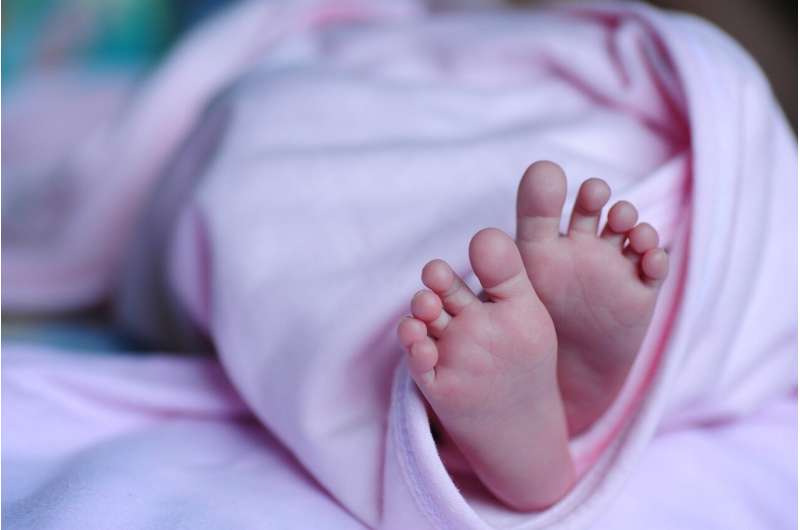This article has been reviewed according to Science X's editorial process and policies. Editors have highlighted the following attributes while ensuring the content's credibility:
fact-checked
trusted source
proofread
Even with resolution, acute kidney injury in newborns can be life-threatening from very first episode

Our resilient kidneys are invaluable members of the body's purification system, and they excel at bouncing back after injury. This even holds true for most sick infants in the neonatal intensive care unit. Because of this remarkable ability, dips in kidney function in infants were often overlooked historically in favor of other pressing diseases or symptoms.
But physicians and researchers have shown increased interest in understanding kidney health in newborns and young infants within the last decade, leading to the AWAKEN study (Assessment of Worldwide Acute Kidney Epidemiology in Neonates). With initial results reported in 2017, AWAKEN was the first major multicenter effort to examine acute kidney injury, or AKI, in newborns.
In a recently published follow-up analysis of the AWAKEN data in JAMA Network Open, Austin Rutledge, D.O., a fellow in neonatal and perinatal medicine at the Medical University of South Carolina, led a multicenter team to examine the impact of repeat episodes of AKI in hospitalized infants. Their work was performed on behalf of the Neonatal Kidney Collaborative, a nonprofit group of neonatologists and pediatric nephrologists working to reduce the burden of kidney disease in newborns.
The original AWAKEN study showed that 30% of the approximately 2,000 babies studied had an AKI and that having an AKI was associated with a fourfold higher risk of death.
Heidi Steflik, M.D., MSCR, a neonatologist at MUSC and one of the primary investigators on the recent report, emphasized that the AWAKEN study revealed kidney disease as not only very common in newborns but also an independent contributor to infant mortality. That is, it is not just an ancillary result or an indicator of other illness.
"But what we didn't know from the original data was if these babies had experienced one or multiple episodes of AKI," added Rutledge. "So we didn't know if the ones who had multiple AKIs had a greater chance of death or if one AKI was enough to adversely affect outcomes."
The research team reexamined the AWAKEN data to see if certain groups of infants were more prone to repeat episodes and if these repeat incidents increased the risk of death or other adverse outcomes. The MUSC researchers collaborated with Russell Griffin, Ph.D., a statistician at the University of Alabama at Birmingham, and with researchers from several other medical centers.
They combed through the data by hand to determine which babies with AKI across 24 neonatal intensive care units nationwide had one or multiple occurrences, using newly defined criteria to make the call. They looked at characteristics like gestational age, birth weight and the initial stage of AKI, and they examined outcomes like risk of death and length of hospitalization.
They discovered that a large proportion of babies with AKI had recurrences: of the 605 infants with AKI, 133 had more than one episode. But the mortality rate increased with any AKI, starting from the very first episode.
"Because the kidneys tend to bounce back, AKI has sometimes been disregarded in the past," said Steflik. "But we found that even one episode of AKI is dangerous."
Further episodes did not add an additional risk of death but were associated with lengthier hospital stays for these children, some of whom were in the NICU for months. Further, the long-term effects of these injuries are still under investigation.
Similar results were found in a separate study of MUSC patients in 2020-2021.
Based on these findings, Rutledge and Steflik suggest that both initial AKI and recurrent episodes deserve careful monitoring and management as well as further study.
"Kidney health is something that has been underappreciated across the spectrum, but particularly in babies," said Steflik. "We're really excited to be part of the groups that are paying attention."
Looking to the future, Rutledge explained that researchers are looking for better ways to detect and measure AKI, since the current measurement—the serum creatinine level—has a delay before showing positivity. There is also interest in learning more specifics about the duration of AKI as well as the long-term impacts on children.
"As we continue to study the long-term effects of AKI, we want families and parents to understand how important it is to follow up with a nephrologist after a NICU stay," said Rutledge. "Our goal is for every baby who has had kidney injury to be monitored regularly for kidney health."
More information: Austin D. Rutledge et al, Incidence, Risk Factors, and Outcomes Associated With Recurrent Neonatal Acute Kidney Injury in the AWAKEN Study, JAMA Network Open (2024). DOI: 10.1001/jamanetworkopen.2023.55307


















